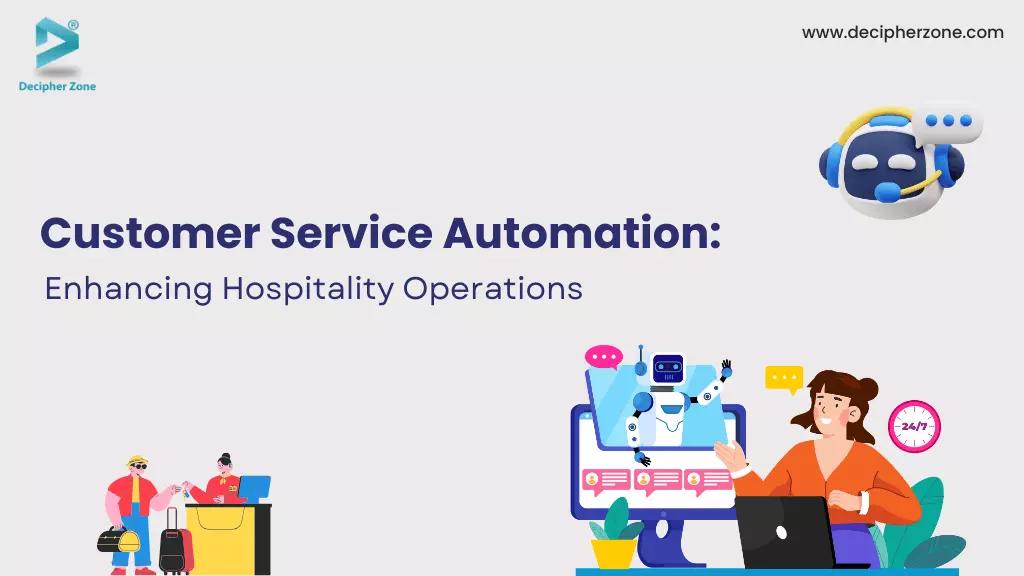Quick Summary: Minimize your repetitive tasks, make your operations smooth, and provide the seamless experience your guests deserve. This blog covers the numerous benefits of automation in hotel operations, real-world applications, and challenges you might face in customer service automation. It explores how the integration of AI can simplify your operations.
As more people travel, customers often deal with long waits for help during busy times. Support staff may feel overwhelmed by difficult questions and repeated tasks, which can slow down problem-solving and lower service quality. When staff manually enter data and handle other tasks, it can lead to more mistakes and inefficiencies in operations.
This is where customer service automation comes into play, Automated Customer Service is like a backstage crew in a theatre production. Guests may never see the magic happening behind the curtains, but they feel its impact on the seamless performance of their stay.
Picture everyday tasks–answering repetitive queries, managing reservations, tracking requests, freeing up human staff to deliver moments of genuine warmth and creativity. Doesn’t this sound relaxing and a well-orchestrated masterpiece?
This blog explores how hospitality businesses can transform by embracing automation. By integrating advanced technologies, establishments can not only elevate the overall guest experience which offering personalized services and timely responses but also optimize their internal operations for greater efficiency.
Stay with us to find out how blending new technologies with the human touch is shaping the future of customer service in hotels.
Your Learning Journey:
-
What is Customer Service Automation and why it is important,
-
What are the core advantages of Customer Service Automation in hotels,
-
How Customer Service Automation can help businesses simplify their hospitality operations and offer smooth guest experiences,
-
What are the use cases or real-world applications of Customer Service Automation,
-
What are the challenges you might face when developing hotel management software automation,
-
What are the examples of Customer Service Automation in the hospitality industry and how do they work,
-
How can the integration of artificial intelligence help businesses be efficient in customer service automation software?
Understanding Customer Service Automation
Picture walking into a hotel—instead of waiting at the front desk, a virtual assistant greets you by name, and hands-free kiosks handle your check-in effortlessly, and within moments.
This is customer service automation at its finest–a unified blend of technology and efficiency delivering an unparalleled guest experience.
Tools like chatbots, AI, and self-service portals are used to manage customer queries without requiring human intervention. Businesses have relied heavily on phone calls and emails to address concerns. But as they grow, so do the complexities and volume of customer demands.
Automation is a backstage hero who can manage routine tasks with precision, ensuring guests receive instant answers and support any time of the day, from costs to elevating service quality, freeing human agents, focusing on high-value and creative problem-solving.
Customer Experience Automation is about reimaging what’s possible such as reducing response times, minimizing errors, and ensuring no query is overlooked.
For businesses, this translates to optimized resources and delighted customers. By integrating solutions, businesses can create experiences that feel personal, seamless, and unforgettable.
Core Benefits of Customer Service Automation
Businesses may enhance client connections and focus more on crucial customer experiences by streamlining routine and recurring requests. There are various benefits of customer service automation, here are a few:
1. Faster Response Times
Automated systems respond to client requests and address problems immediately, reducing the delays which are mainly human-based.
AI automation in customer service technology uses Natural Language Processing (NLP) and machine learning to read customer questions effectively and give appropriate replies and solutions in real time which results in quicker resolution and higher customer satisfaction.
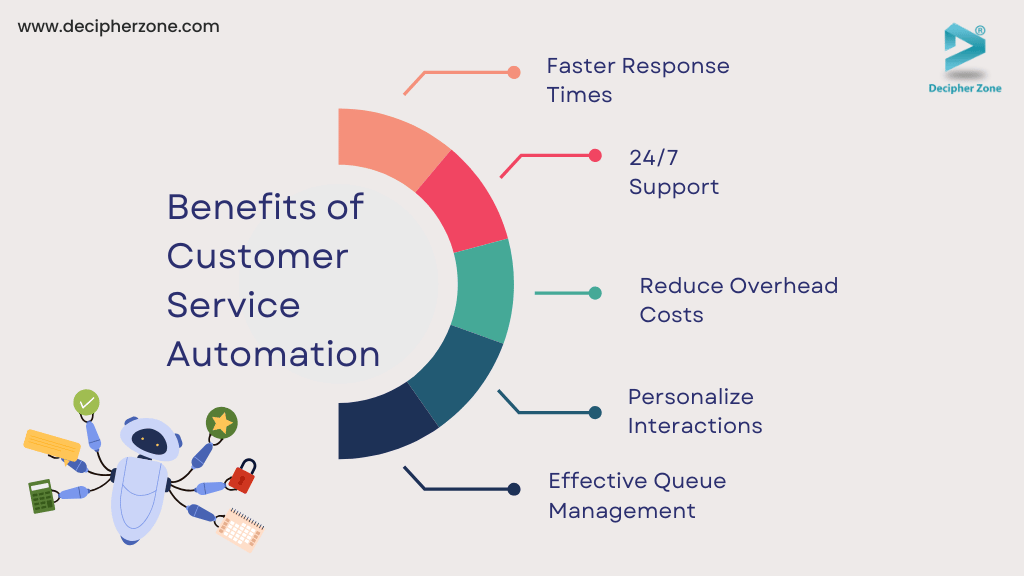
2. 24/7 Support
One of the key benefits of customer service automation in hotels is the ability to provide 24/7 support. Automation tools such as AI chatbots and interactive voice response systems, can operate continuously and handle customer queries at the contact center at any time of day and night.
This around-the-clock availability not only matches the client's expectations but also increases satisfaction and engagement. Clients can get prompt support which leads to faster results and better customer expectations.
3. Reduce Overhead Costs
Customer service automation has the potential to lower overhead costs for businesses. From small agile customer service teams to large organizations aiming to expand their support capabilities, implementing automated solutions, especially in hotels can significantly reduce support tickets.
This leads to operational expenses and streamlining the staffing needs so that businesses can reallocate resources more effectively, enhancing productivity while maintaining quality service.
4. Personalize Interactions
Customers nowadays seek personalized experiences that make them feel valued and unique. Automation tools can collect and analyze data such as customer preferences, past interactions, purchase history, and browsing behavior.
This data-driven approach enables businesses to craft tailored responses, suggestions, and promotions that are relatable and attractive on a personal level.
5. Effective Queue Management
Customer service automation simplifies queue management by reducing wait times and streamlining customer flow. Automated systems efficiently direct customers to the right department or service which enhances both operational efficiency and the overall customer experience.
In high-traffic locations like banks, restaurants, or hospitals, these systems organize queues, send real-time notifications to customers, and ensure smooth, timely service, minimizing frustration and maximizing satisfaction.
6. Improving productivity & Reduced Workload
Automation allows customers service teams to accomplish more with fewer resources by streamlining operations and enhancing efficiency. By automating repetitive tasks such as ticket routing and responding to common inquiries, call center automation reduces costs and allows agents to focus on solving more complex issues.
Automation tools enhance first-contact resolution rates and shorten average handling times which enable faster issue resolution and boost customer satisfaction.
How does Customer Service Automation Work?
Customer service automation utilizes advanced technologies, particularly AI to streamline and enhance interactions between businesses and customers.
By automating repetitive and time-consuming tasks, companies can improve efficiency, reduce costs, and deliver consistently high-quality service.
Automation can easily handle routine inquiries and processes which minimizes the need for human intervention at every step. This allows businesses to focus their resources on more complex issues.
Imagine in a hotel’s customer service department, a guest named Sarah sends an email asking about the availability of a room with a sea view. Instead of manually processing email and assigning it to a customer service agent, you can utilize automation as it can transform the way guest inquiries are handled.
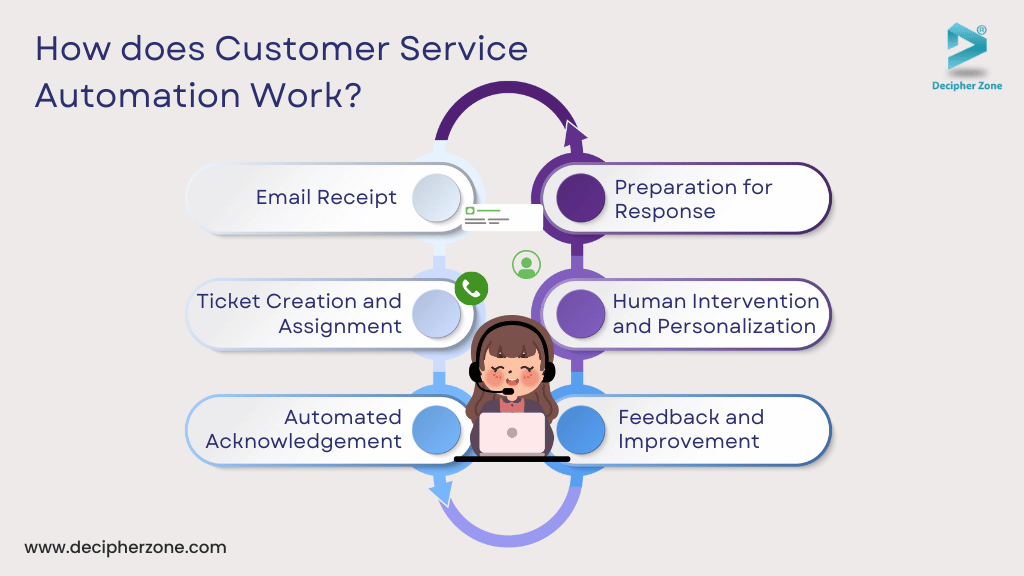
Following is the way to streamline the process:
-
Email Receipt: An automated system scans the content Sarah mentioned in the email. By recognizing keywords such as “room availability” or “sea view”, the system determines the nature of her inquiry.
-
Ticket Creation and Assignment: The system automatically generates a support ticket and assigns it to a representative specializing in room bookings and special requests.
-
Automated Acknowledgement: An automated email is sent to Sarah, confirming the receipt of her email and inquiry and providing an estimated response time.
-
Preparation for Response: Before the representative accesses the ticket, the system retrieves relevant information including current room availability, pricing, and the client's previous interactions with the hotel. This ensures the representative has the context needed for a personalized response.
-
Human Intervention and Personalization: With all the necessary details in hand, the representative can either use a pre-defined template or craft a custom reply that offers client details about sea view rooms, availability, and any special request.
-
Feedback and Improvement: Once the inquiry is resolved the client receives an automated follow-up email with a satisfaction survey. The feedback collected is used to enhance the hotel’s customer service processes.
Utilizing automation, the hotel ensures that inquiries are addressed efficiently and accurately, reducing response times and delivering a personalized guest experience.
Meanwhile, human agents can focus on more complex and nuanced guest interactions that improve overall service quality.
Use Cases of Customer Service Automation
There are various strategies for automated customer service to effectively address and fulfill customer needs. Below are some key use cases that highlight how automation can enhance the overall experience:
1. Order Tracking
Order tracking automation allows customers to monitor the real-time delivery status and access updates of their room service order, luggage delivery, or other amenities.
Email and SMS automated notifications keep customers informed about the entire delivery process, improving transparency, and lowering manual inquiries.
This not only improves operational efficiency but also builds customer confidence through transparency in their order’s progress. Thus, it enhances the overall purchasing experience and boosts brand loyalty.
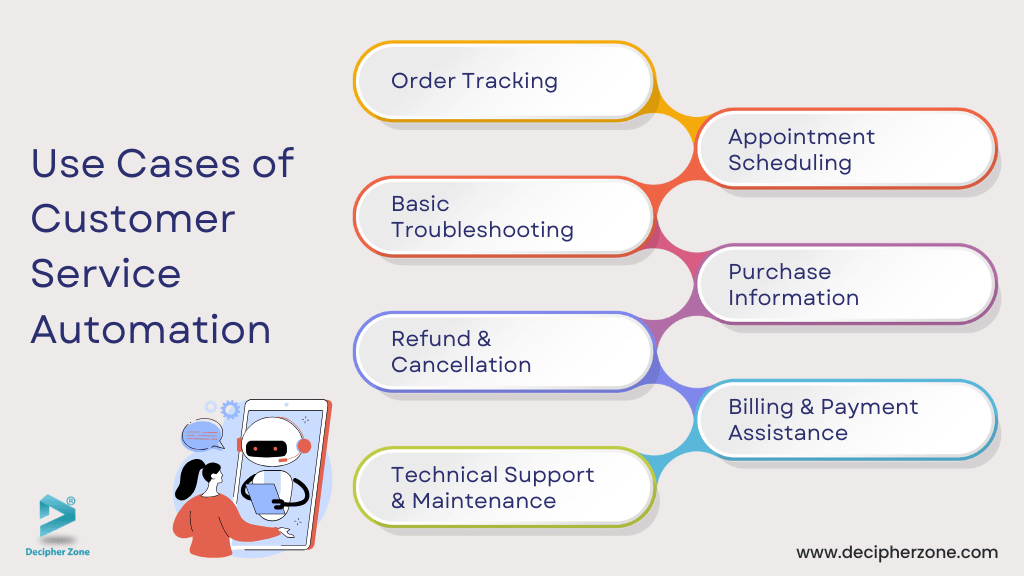
2. Appointment Scheduling
Automating appointment scheduling simplifies the booking process by allowing customers to book appointments for spa treatments, restaurant reservations, or activity sessions online easily.
With real-time availability, customers can select convenient time slots without consulting or coordinating manually. This mechanization reduces administrative tasks for businesses as it frees up staff for other responsibilities.
Automated systems send confirmations and reminders timely which reduces no-show rates and improves efficiency, providing a seamless booking experience.
3. Basic Troubleshooting
Interactive tools like virtual assistants help customers resolve common inquiries on their own. These automated systems offer step-by-step instructions after analyzing client inquiries and provide troubleshooting tips, and solutions tailored specifically to the problems listed.
This automation allows self-service options and enables quick resolution of issues which reduces the volume of support requests, eases the burden on support teams, and increases customer satisfaction.
4. Purchase Information
Self-service portals or chatbots automate access to comprehensive purchase information by allowing customers to instantly get detailed specifications, usage of guidelines, and troubleshooting tips. This allows customers to make informed purchasing decisions at their convenience without needing any assistance from humans.
5. Refund & Cancellation
Automating the room booking cancellation and refund process involves providing guests with pre-filled cancellation forms, automated refund processing, and clear instructions for rescheduling.
This streamlines the entire process from initiation to completion, significantly reducing administrative overhead and manual intervention.
Simplifying the cancellation process enhances guest satisfaction by reducing friction and offering a hassle-free experience. Guests appreciate the convenience which results in a more positive perception of the hotel and an increased likelihood of repeat bookings.
6. Billing & Payment Assistance
Automated billing and payment assistance systems manage guest inquiries where systems can securely process payments, resolve common issues, and provide detailed billing summaries.
By automating tasks like incorrect invoices, disputed charges, and billing support, the organizations can improve the accuracy of financial transactions by reducing the need for manual intervention, and streamline payment processes. Businesses offering 24/7 availability can provide guests can access to billing and payment assistance at their convenience.
7. Technical Support & Maintenance
Automating the technical support systems incorporates AI tools to remotely identify and troubleshoot common technical issues. With the help of AI, the systems can analyze error codes, log files, and system configurations to improve the areas of root cause and recommend real-time solutions.
The automated process allows businesses to resolve issues without even manual intervention, reduces downtime, and makes sure the service delivery is uninterrupted.
Barriers to Customer Service Automation
While automating customer service brings considerable advantages, it also introduces a variety range of challenges that businesses must address to ensure customer satisfaction and operational efficiency by developing strategies. Below are some challenges that businesses should consider:
1. Lack of Human Interaction
Customer service automation can lack the personal touch and empathy that are important for building strong guest relationships. For example, a chatbot might provide standard responses to inquiries about room cleanliness but fail to convey genuine concerns or offer personalized resolutions.
This lack of human connection can weaken guest loyalty and result in dissatisfaction, especially in situations where emotional understanding is crucial.
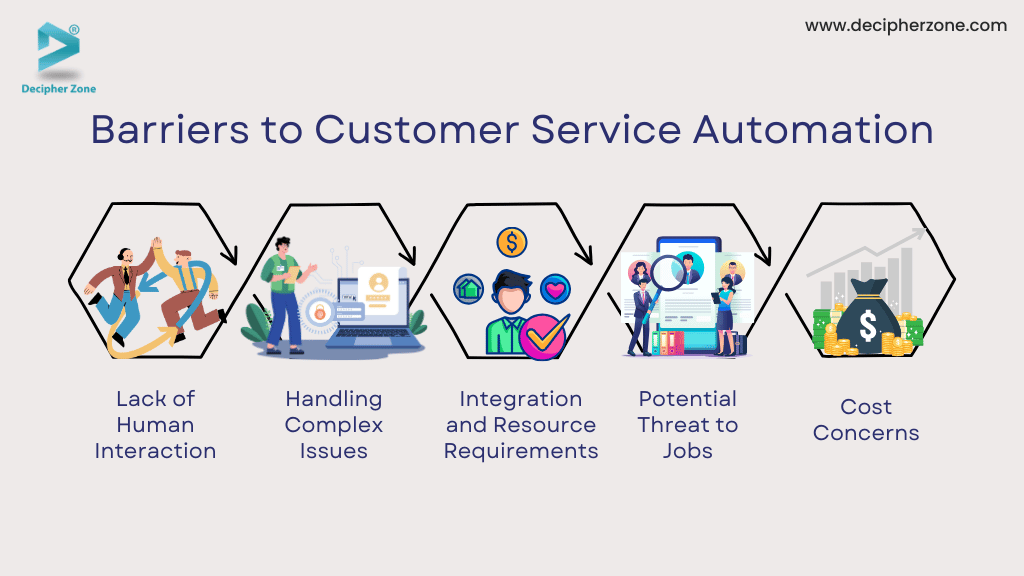
2. Handling Complex Issues
While automation is highly appropriate for managing routine tasks like booking confirmations or simple inquiries, it falls short in addressing complex guest concerns.
For example, resolving a dispute about a billing error involving multiple services or accommodating a unique request for a special event may require human intervention.
Automating systems are inability to handle such nuanced problems can create bottlenecks and delay resolutions which leads to guest frustration.
3. Integration and Resource Requirements
Implementing customer service automation faces challenges like selecting incompatible technologies, underestimating the capabilities of AI tools, or failing to align automation with operational goals can result in wasted time, resources, and missed opportunities to improve guest service.
This hospitality industry demands seamless integration with existing property management systems (PMS), customer relationship management (CRM) tools, and payment gateways to avoid any issues.
4. Potential Threat to Jobs
Customer service automation may create anxiety among staff mostly who fear displacement or job less. Concierge staff or front desk staff can replace their roles with an automated booking system or chatbots.
Reassuring the staff by emphasizing their irreplaceable value in providing personalized, human-touch support. It is essential to encourage the employees to utilize their unique skills and proactively address guest concerns based on past preferences, ensuring that automation enhances rather than replaces their role.
5. Cost Concerns
Customer service automation tools such as chatbots, or virtual assistants require financial investment. Natural language processing (NLP) and Natural language understanding (NLU) ensure accurate and intuitive communication with guests.
Without robust capabilities, automating systems may fail to deliver a cost-effective solution which effectively leads to unsatisfactory guest experiences and wasted resources.
5 Examples of Customer Service Automation
Customer service automation includes a wide range of elements designed to improve the efficiency and quality of support for customers. Some of the examples of customer service automation in hotels are:
1. Automated Ticketing Systems
Automated ticketing systems simplify guest inquiries by routing them to the most suitable department or staff member. For example, a request for room service can be automatically directed to the kitchen staff, while a maintenance issue is sent to the engineering team.
This makes sure that no guest inquiry is overlooked, resulting in improved response times and guest satisfaction.
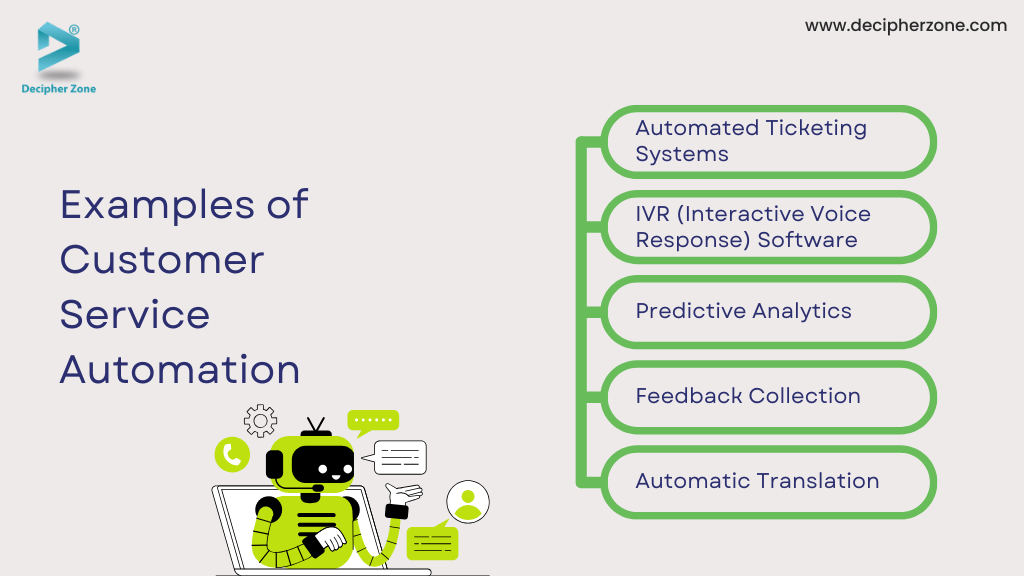
2. IVR (Interactive Voice Response) Software
IVR systems greet callers and provide self-service options such as checking room availability or confirming booking through pre-recorded messages.
These systems can direct callers to the suitable department to resolve the inquiry, for example, the front desk for check-in assistance or accounting for billing queries.
Automated payment processing for services like spa reservations or event bookings can also be handled by these systems which reduces the workload on staff.
3. Predictive Analytics
Predictive analytics mainly enable hospitality businesses to anticipate guest needs and address issues before they even arise. For example, analyzing booking patterns can help businesses predict peak seasons and provide personalized promotions to attract more customers.
This approach improves customer satisfaction and optimizes resource allocation leading to overall operational efficiency.
4. Feedback Collection
Feedback systems such as post-stay surveys or in-app feedback forms can help hospitality operational staff gather valuable insights into customer experiences. This automation enables staff to identify areas for improvement and implement target strategies to improve customer engagement and satisfaction.
5. Automatic Translation
With the help of automatic translation language is no longer a barrier, automated translation tools allow seamless communication with international customers.
Using chatbots or guest portals that support multilingual can provide access to information about amenities, book services, or resolve issues without language barriers. This approach expands the global reach and boosts inclusivity.
Final Thoughts
The objective of customer service automation especially in hotels is to manage routine tasks and let staff focus on more complex demands and inquiries. Customer service automation lowers the burden and improves efficiency through 24/7 support and effective queue management.
With automated customer services like self-service portals, automated helpdesks, and chatbots, in the USA or other countries, clients can find solutions to their inquiries at ease and allow specific agents dedicated to each department to resolve more complex issues that require human interaction.

Decipher Zone can weight off your shoulders when it comes to automating your software solution. Explore the future of customer service with AI automation and contact us for expert assistance.
With years of experience, our team can provide you the top-class tailored specifically to your business requirements. Whether you are looking to streamline operations, improve customer interactions, or integrate cutting-edge technology, we are ready with our proficient team. Contact us today!
FAQs
-
What strategies do businesses use to implement customer service automation?
By identifying manual and repetitive tasks that need to be automated and setting up the workflow on the systems required is the way to implement customer service automation.
-
What kind of industries benefit from customer service automation?
Most businesses that handle a high volume of customer interaction including e-commerce, travel, and service industry benefit from customer service automation.
-
What are the challenges businesses face in customer service automation?
The most common challenges businesses face are lack of human interaction, handling complex issues, integration and resource requirements, potential threats to jobs, and cost concerns.
-
How can customer service automation handle complex inquiries?
Customer service automation is built for common queries and for managing routine tasks, but some inquiries require human intervention to handle the situation well and provide an emotional touch.

